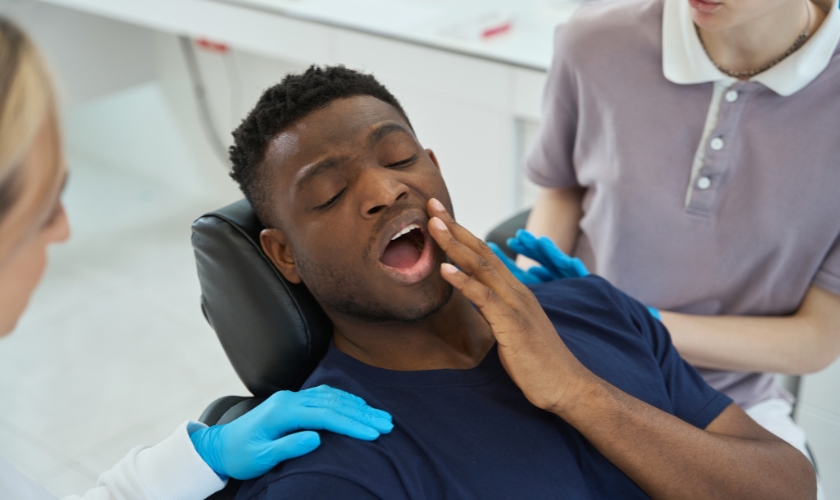
Living with diabetes comes with its fair share of health challenges, and one area that often gets overlooked is dental care. Diabetics are at a higher risk for dental issues, which means an urgent dental situation can quickly become a serious concern.
Whether it’s severe tooth pain, gum infections, or an accident that leaves you in pain, knowing how to handle a dental emergency can make all the difference.
Understanding how diabetes impacts oral health is key to managing these situations. In this blog, we’ll explore why emergency dentistry is so important for diabetics and highlight specific considerations you need to keep in mind.
From recognizing the warning signs of a dental emergency to finding the right dentist, we’ll cover everything you need to know. If you or a loved one live with diabetes, staying prepared and informed about how to address potential dental emergencies will help you avoid complications and ensure a healthier smile.
So, let’s dive into the world of emergency dentistry and arm you with the knowledge to tackle any dental challenges that come your way!
How Diabetes Affects Oral Health: Increased Risk of Dental Issues
Diabetes impacts more than just blood sugar levels; it can also lead to a range of oral health problems. Diabetic patients are at a higher risk for developing gum disease, dry mouth, and infections, all of which can worsen if not properly managed. Blood sugar fluctuations can weaken the body’s ability to fight off infections, making the gums especially vulnerable to damage.
- Gum disease (periodontitis) is a common issue among diabetics. High blood sugar levels contribute to the growth of harmful bacteria in the mouth, which can lead to infections and inflammation in the gums.
- Dry mouth can develop due to decreased saliva production, a side effect of some diabetes medications. Without enough saliva, your mouth becomes more prone to cavities, gum disease, and discomfort.
- Infections are more difficult to treat in diabetics. Elevated blood sugar weakens the immune system, reducing its ability to fight oral bacteria effectively.
Identifying Dental Emergencies in Diabetic Patients
For diabetics, it’s essential to recognize the signs of a dental emergency early. Since diabetes weakens the immune system, what may seem like a minor issue for someone else can escalate quickly into a serious concern.
- Severe tooth pain may indicate a deep infection or abscess, which can spread rapidly in diabetic patients if not treated immediately.
- Gum bleeding that doesn’t stop, especially with minimal pressure, can signify advanced gum disease or an infection, which may require urgent care.
- Swelling or fever in the mouth, face, or jaw, which can point to an infection that has spread beyond the gums.
It’s important to monitor blood sugar levels during a dental emergency. Uncontrolled blood sugar can lead to more rapid bacterial growth, making the issue more difficult to treat. Early intervention with emergency dental services for diabetics is key to preventing serious complications.
Managing Dental Emergencies for Diabetics: Immediate Steps
When a diabetic patient faces a dental emergency, the situation can quickly become more complicated due to the impact of uncontrolled blood sugar levels. Here’s how to manage the situation efficiently:
- Step 1: Control your blood sugar levels. Before seeking emergency care, it’s crucial to ensure your blood sugar is within a safe range. High blood sugar can worsen infections and delay healing.
- Step 2: Apply pressure to stop bleeding. If there is significant bleeding, gently apply pressure with a clean cloth to control it.
- Step 3: Seek emergency dental care. Whether it’s tooth pain, abscesses, or injuries, make sure to contact a professional for immediate care. Diabetic patients need more prompt attention to avoid complications.
- Step 4: Stay calm and follow instructions. Anxiety can raise blood sugar, so it’s essential to stay calm and follow the dentist’s guidance carefully.
Timely emergency dental services for diabetics can help prevent long-term complications like infections or prolonged recovery periods.
How Diabetes Affects Healing After Dental Procedures
One of the challenges diabetics face in oral care is slower healing after dental procedures. High blood sugar levels hinder the body’s natural ability to heal and fight infections, which can lead to complications after dental treatments, especially in emergency situations.
- Slower wound healing: Elevated blood sugar can impair the body’s ability to form new tissue and repair damaged areas, increasing the risk of infections after dental procedures.
- Increased risk of infection: Since diabetes weakens the immune system, wounds in the mouth may become infected more easily.
- Post-surgery care: After dental procedures, diabetics need to carefully monitor their blood sugar levels to ensure they stay within a healthy range. This will help prevent complications such as infections or delayed healing.
Emergency Dentistry and Diabetic Medications: What to Know?
Medications play a significant role in the management of diabetes and can affect dental care. It’s vital for diabetic patients to inform their dentist about their medications, as some can impact oral health and treatment options.
- Insulin and oral diabetic drugs can lead to dry mouth, a condition that makes the mouth more prone to cavities and gum disease. Dry mouth can also complicate the healing process after dental procedures.
- Medication interactions: Some medications may interfere with the body’s natural ability to fight infection or affect blood clotting, making it critical to communicate with your dentist about any changes in medication or dosage.
- Prepare for appointments: Bring a list of medications, recent glucose readings, and any health updates to your dental appointments. This information helps the dentist provide the most appropriate care.
An emergency dentist in Hutchinson will be well-versed in addressing the unique needs of diabetic patients, ensuring that treatment doesn’t interfere with medication or other health conditions.
Choosing an Emergency Dentist for Diabetic Patients
Finding the right emergency dentist for diabetic patients is essential to ensure proper care during urgent situations. It’s not just about dental expertise; the dentist must be familiar with the unique challenges diabetics face during dental treatments.
- Specialized care: Choose a dentist who has experience managing dental emergencies for diabetic patients. These professionals are familiar with the extra precautions required during treatment.
- Communication: Make sure the dentist is willing to discuss your diabetes management plan and tailor their approach to suit your needs.
- Availability: Look for an emergency dentist who offers extended hours or after-hours care. Diabetic patients often need immediate treatment for dental emergencies, and availability can make all the difference.
Managing dental emergencies as a diabetic requires special attention and care. By recognizing the signs of a dental issue early, maintaining stable blood sugar levels, and choosing the right dental professional, you can significantly reduce the risks associated with dental emergencies. Whether it’s finding the right dentist or understanding how medications affect oral health, staying informed ensures better outcomes. Keep these considerations in mind, and you’ll be prepared for whatever dental emergency comes your way.


